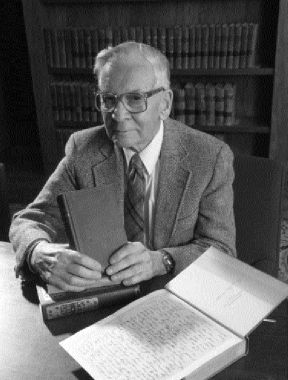The Rochester Review, University of Rochester, Rochester, New
York, USA
![]()


 Ray Borst '33 thought he was just doing a favor for his wife when he picked up his first copy of 'Walden' back in the '50s. Now his Thoreau collection--recently deposited in Rush Rhees Library --is one of the greatest in the world.
Ray Borst '33 thought he was just doing a favor for his wife when he picked up his first copy of 'Walden' back in the '50s. Now his Thoreau collection--recently deposited in Rush Rhees Library --is one of the greatest in the world.
By Kathy Quinn Thomas
We do not ride on the railroad, it rides upon us," said the solitarian sage Henry David Thoreau. Considered a wise man, but not necessarily a prescient one, Thoreau might enjoy knowing the prophetic connection between that sentence and the following tale.
A businessman's long-ago train ride from Chicago to Upstate New York has nearly half a century later resulted in an unforeseen boon to all champions of the American naturalist and philosopher: a rare, complete, and extremely valuable collection of Thoreau's works that has in recent months been deposited in the Rare Books and Special Collections Department of Rush Rhees Library.
The traveler, Raymond Borst '33, explains why that long-ago train trip was so significant. "My wife needed a copy of Walden for a paper on American literature she was writing for her book club," he remembers. "I was on my way to Chicago on business and told her I'd pick up a copy while I was there. I found one in the hotel book shop, and, for something to do on the train, I started reading it. And I fell in love--and I wanted more."
The "more" kept growing as Borst began to accumulate whatever he could find of the author's published oeuvre. ("It takes two to speak the truth--one to speak and another to hear," Thoreau said. Borst heard.) A formal collection, though, was totally unintentional, he says. "I didn't really know what I was amassing. My wife and I used to visit New England and go through all the old book shops looking for Thoreau finds. I just bought this and bought that, and then, gradually, it became a collection."
Borst may have backed into collecting, but quelle collection! as the French might say. "Ray knew from the first time he and I shook hands 18 years ago that we wanted to house this amazing treasure," says Peter Dzwonkoski, head of the library's rare books department. "It is the best printed Thoreau collection in the world, save the Thoreau Society's own, which is perhaps better but only in trifling ways." The collection came to the University through a gift from Borst and a grant from the Viburnum Foundation.
Comprehensive Thoreau collections are rare indeed, Dzwonkoski says. Largely unnoticed and unappreciated in his lifetime (1817-1862), Thoreau lived to see only two of his books published: Walden, or Life in the Woods, in 1854, and A Week on the Concord and Merrimack Rivers, in 1849. In fact, A Week on the Concord was what would
today be called a vanity publication: Thoreau himself paid to have it printed. After four years of poor sales, the publisher, needing the space, returned more than 700 unsold copies to the author.
It was only after his death that interest in his writings took off, and previously unpublished work began appearing, including his book on Cape Cod, journals, letters, lectures, poems, and essays. Most of these were first printed in runs of fewer than a thousand, making copies now hard to come by.
The Raymond R. Borst Collection of Henry David Thoreau is made up of some one thousand items and includes first editions of all of the author's published books plus a wide range of rare 19th-century magazines and pamphlets containing articles unavailable in any other form.
Among the latter is the first issue of Dial magazine, which includes two pieces by Thoreau. "That took an immense amount of detective work on Ray's part," says Dzwonkoski. "The early Dials didn't specify the authors of the various pieces. Ray had to comb through pages of stories to verify which ones were by Thoreau."
A successful Auburn, New York, dealer in trucks and heavy farm equipment, Borst, via his collection, also became a successful nonacademic scholar, publishing four books of his own (all, of course, concerning his favorite author). Among them is what Dzwonkoski terms "the standard Thoreau bibliography."
"These bibliographies are usually compiled by academics, professors who need to publish or perish," he notes. "Ray did this because he wanted to, for his love of the subject matter."
"Not being an academic, I had to learn how to compile and write a bibliography as I went along," says Borst. "I've since seen copies of it in Paris and in a library in London. It is extremely gratifying to know that what I have done has merit."
He also combed through his collection to compile The Thoreau Log: A Documentary Life of Henry David Thoreau, 1817-1862, a day-by-day account of the author's life ('Walden Published. Elder-Berries. Waxwork Yellowing.').
Now that the Thoreau collection is out of his historic 1813 house in Auburn (he kept the books in a modern addition to the original building), Borst says he has no plans to fill the vacuum with more things. "I don't think I'll be collecting any more," he says, possibly with some relief. Instead, he putters around the house and walks daily on the hundred-acre site. "It feels good to let go of the collecting part of my life," he says, "and simply enjoy being 87 years old."
Associate editor/writer for the Office of University Public Relations, Kathy Quinn Thomas edits Currents, the University's employee newsletter.
| UR Home
| Review Contents |
Mail |

Copyright 1997, University of Rochester